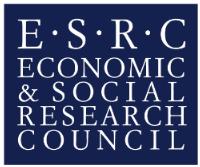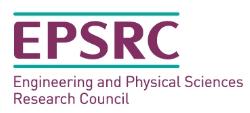Submitted by Sara Serradas Duarte on Mon, 23/10/2017 - 21:46


 This investment is a response to a demonstrable call from businesses, policy makers, regulators and other institutions who must make risk-based judgements considering multiple possible consequences, that factor in uncertainty. For example, whether to build a high-speed rail link; when to abandon a flood defence; when an engine component is more likely to fail; when to restrict growth in credit to protect financial stability.
This investment is a response to a demonstrable call from businesses, policy makers, regulators and other institutions who must make risk-based judgements considering multiple possible consequences, that factor in uncertainty. For example, whether to build a high-speed rail link; when to abandon a flood defence; when an engine component is more likely to fail; when to restrict growth in credit to protect financial stability.
Examples of the disciplines these networks seek to engage with include: Applied Mathematics, Engineering, Operational Research, Economics, Finance, Environmental Science, Management Science, Arts and Humanities, Political Science, Computer Science, Psychology, Risk, Medical Informatics, Statistics and Applied Probability, Data Science and Information Science.
Examples of some of the topics that might be addressed include algorithms, data science, decision making, sensors, forecasting, risk management, financial regulation, consumer behaviour, heuristics, macroeconomic modelling, multi-scale/multiphysics modelling, engineering design, visualisation, large scale manufacturing, climate change, energy challenges and natural hazards.
The two funded Networks are M2D (Models to Decisions) and CRUISSE (Challenging Radical Uncertainty in Science, Society and the Environment).
The M2D network is focusing on member led model-informed decision making and defines itself as broad, inclusive and multidisciplinary. M2D welcomes participants from a diverse range of academic research and public / private sector backgrounds. M2D will function within the scope of three core themes of Uncertainty Quantification, From Models to Decisions and Communicating Uncertainty, and through its growing network , aims to connect otherwise disparate communities working on how mathematical modelling can effectively support practitioners. The M2D network supports community activities through its feasibility funding schemes, as well as through a series of annual conferences, workshops and events. The network’s ambition is to establish the UK as a world leader in decision making under uncertainty. In support of this high level ambition the network is primarily focusing upon:
- Establishing a decision making under uncertainty community in the UK via networking events (both online and real-world).
- Defining a research agenda that will address how to improve decision making under uncertainty in real-world problems.
- Actively engaging with practitioners to develop and deliver ‘best practices’ that are salient, useable and credible to the practitioner community.
- Pump priming research projects via short-term feasibility studies to tackle substantive interdisciplinary research problems involving models, uncertainty and decisions.
The CRUISSE network brings academics from the mathematical, physical, psychological, social and other sciences together to better understand and help practitioners from a wide variety of fields who are faced with the need to make sometimes critical decisions under conditions of risk and uncertainty.
Support stems from understanding the actual question, so the first step for the network is to invite decision-makers in industry, government and civil society to discuss their challenges. CRUISSE is identifying what aspects of the real-world challenges that practitioners face and categorises them according to whether they:
- fall into traditional statistical/decision theoretic methods or
- require a broader‑approach as mature probabilities are not available or
- are dominated by radical uncertainty1 and require thoughtful case-by case‑reflection.
The second step is to explore the way problems are being set up and framed in the light of the type of uncertainties identified. CRUISSE will develop useful guidelines including steps towards a guide to good practice, which will broaden the awareness of alternative approaches. Practitioners aware of the kinds of problems and solutions in each “Box”, and where the problems of interest to them lie, will be a step closer to resilient decision-making, informed by seeing a range of approaches taken by others facing real-world decision making.
For further information regarding the M2D Network please visit the M2D Network website or contact the M2DProject Manager on m2d@exeter.ac.uk
Further details can be found on the CRUISSE website. The network can be emailed at cruisse@ucl.ac.uk.


